#statement of purpose example
Explore tagged Tumblr posts
Text
Best SOP Writer Service
Looking for the Best SOP Writer Service to craft a compelling Statement of Purpose (SOP)? A professional SOP writing service can help you stand out by highlighting your academic achievements, career aspirations, and unique strengths. The best services offer personalized content tailored to your specific goals, ensuring that your SOP is engaging, well-structured, and impactful. With experienced writers who understand the requirements of top universities and programs, you can confidently submit an SOP that increases your chances of admission. Choose the Best SOP Writer Service to make a strong impression and enhance your academic journey.
#statement of purpose#how to write a statement of purpose#how to write statement of purpose#statement of purpose phd#statement of purpose for phd#writing statement of purpose#statement of purpose example#personal statement
1 note
·
View note
Text
Radblr stop outright saying that women don't sexually abuse people\a fully female separatist community would have no risk of sexual abuse challenge
#it's so clear that hating men is more important to a lot of people on here than uplifting women#given for example how willing you are to alienate abuse victims and make them feel unsafe#for what purpose? so you can keep making hyperbolic statements about how naturally virtuous women are compared to men?#txt
7 notes
·
View notes
Text
some of yall will really reblog anything no matter just HOW obviously fake it is if it be comfirming the biases and just. i know this is the pissing on the poor website but jesus fucking christ
#mona rambles#'i can't fact check everything' OBVIOUSLY. the solution here is to NOT REBLOG IT then#like all discussions on fucking basic media literacy aside#if there isn't a source. if there's clearly inciting statements SO obviously meant to get people mad#(staff DELETED the IMAGES and ops ACCOUNT they are SCARED of our opinion. be so fucking serious rn)#and you cannot be fucked to fact check for whatever reason (valid)#the answer is not. to say ehh fuck it#like. this is a relatively harmless example (on purpose) but like..... girlypops i am begging#the shit some of yall have put on my dash makes me WORRY#anyway. again. i know this is the piss on the poor webbed site and I'm preaching to a wall#but.yeah.sigh
4 notes
·
View notes
Text
Statement of Purpose (SOP) for Study Abroad: How to Write an Impressive SOP
A Statement of Purpose (SOP) is a crucial part of the application process for studying abroad. It provides admissions committees with insight into your academic background, goals, and personal motivations beyond your grades and test scores. A well-written SOP can significantly enhance your chances of acceptance by showcasing your unique qualities and passion for your chosen field. The essay should also address why you are interested in studying abroad and how you plan to contribute to the institution.
For more details on how to craft a compelling SOP, visit Statement of Purpose for Study Abroad.
#SOP for study abroad#writing SOP#statement of purpose#study abroad SOP tips#SOP format#admission SOP#visa SOP#study abroad#international students#how to write SOP#graduate program SOP#undergraduate SOP#personal statement#letter of intent#SOP examples#SOP structure
0 notes
Text
actual writing advice
1. Use the passive voice.
What? What are you talking about, “don’t use the passive voice”? Are you feeling okay? Who told you that? Come on, let’s you and me go to their house and beat them with golf clubs. It’s just grammar. English is full of grammar: you should go ahead and use all of it whenever you want, on account of English is the language you’re writing in.
2. Use adverbs.
Now hang on. What are you even saying to me? Don’t use adverbs? My guy, that is an entire part of speech. That’s, like—that’s gotta be at least 20% of the dictionary. I don’t know who told you not to use adverbs, but you should definitely throw them into the Columbia river.
3. There’s no such thing as “filler”.
Buddy, “filler” is what we called the episodes of Dragon Ball Z where Goku wasn’t blasting Frieza because the anime was in production before Akira Toriyama had written the part where Goku blasts Frieza. Outside of this extremely specific context, “filler” does not exist. Just because a scene wouldn’t make it into the Wikipedia synopsis of your story’s plot doesn’t mean it isn’t important to your story. This is why “plot” and “story” are different words!
4. okay, now that I’ve snared you in my trap—and I know you don’t want to hear this—but orthography actually does kind of matter
First of all, a lot of what you think of as “grammar” is actually orthography. Should I put a comma here? How do I spell this word in this context? These are questions of orthography (which is a fancy Greek word meaning “correct-writing”). In fact, most of the “grammar questions” you’ll see posted online pertain to orthography; this number probably doubles in spaces for writers specifically.
If you’re a native speaker of English, your grammar is probably flawless and unremarkable for the purposes of writing prose. Instead, orthography refers to the set rules governing spelling, punctuation, and whitespace. There are a few things you should know about orthography:
English has no single orthography. You already know spelling and punctuation differ from country to country, but did you know it can even differ from publisher to publisher? Some newspapers will set parenthetical statements apart with em dashes—like this, with no spaces—while others will use slightly shorter dashes – like this, with spaces – to name just one example.
Orthography is boring, and nobody cares about it or knows what it is. For most readers, orthography is “invisible”. Readers pay attention to the words on a page, not the paper itself; in much the same way, readers pay attention to the meaning of a text and not the orthography, which exists only to convey that meaning.
That doesn’t mean it’s not important. Actually, that means it’s of the utmost importance. Because orthography can only be invisible if it meets the reader’s expectations.
You need to learn how to format dialogue into paragraphs. You need to learn when to end a quote with a comma versus a period. You need to learn how to use apostrophes, colons and semicolons. You need to learn these things not so you can win meaningless brownie points from your English teacher for having “Good Grammar”, but so that your prose looks like other prose the reader has consumed.
If you printed a novel on purple paper, you’d have the reader wondering: why purple? Then they’d be focusing on the paper and not the words on it. And you probably don’t want that! So it goes with orthography: whenever you deviate from standard practices, you force the reader to work out in their head whether that deviation was intentional or a mistake. Too much of that can destroy the flow of reading and prevent the reader from getting immersed.
You may chafe at this idea. You may think these “rules” are confusing and arbitrary. You’re correct to think that. They’re made the fuck up! What matters is that they were made the fuck up collaboratively, by thousands of writers over hundreds of years. Whether you like it or not, you are part of that collaboration: you’re not the first person to write prose, and you can’t expect yours to be the first prose your readers have ever read.
That doesn’t mean “never break the rules”, mind you. Once you’ve gotten comfortable with English orthography, then you are free to break it as you please. Knowing what’s expected gives you the power to do unexpected things on purpose. And that’s the really cool shit.
5. You’re allowed to say the boobs were big if the story is about how big the boobs were
Nobody is saying this. Only I am brave enough to say it.
Well, bye!
4K notes
·
View notes
Text
re: last rb, I think the takeaway is not “wow this person is so wrong, Harry Du Bois isn’t a generic white man he’s actually interesting so he’s not an example of a generic white guy character” but that perhaps the writers of the game were making an intentional decision about him being a middle aged white police officer when they wrote the story. like the limitation of dismissing his character as “just another white guy protag” is because it treats ‘representation’ as essentially a doll dress-up game where identity is just a series of discrete inert properties that you plaster onto an already-complete narrative for the purposes of census demographic reflection - that the idea that Harry is a white police officer only because white creators view themselves as default protagonists of all stories and his character is a simple mindless output of that - and not an active component of narrative decision-making. especially disco elysium of all games lol. there’s a fascist named measurehead in it, it’s not exactly subtle about its desire to engage with white supremacy, and I think the game is making a statement about that by forcing you to play as a white cop. and like you can object to those narrative choices and/or the quality of their execution, but Harry could be as ‘generic’ as possible and I don’t think that would make that “just another white guy” critique any more substantive
2K notes
·
View notes
Note
Woah woah woah. Twitter is shutting down in Brasil? I'm thankful for your mental health but what?
Yep.
TLDR: Elon fired everyone in the Brazilian offices of twitter but legally Twitter can't continue existing in Brazil WITHOUT a legal representative. So now our Federal Supreme Court subpoened him to apoint a new representative or the website is getting shut down in the country
The long version with the context about the fight:
It all started when the supreme court started to shut down in the country profiles of brazilian people who had commited crimes using the website (an example is Monark, a dude who literally used his profile to say we should give n*zis and racists unlimited freedom of speech [he fled to the US to escape prison btw]).
Elon caught wind of this and decided to threaten our constitution and said that he would get the profiles back on because he wouldn't accept a government restricting "freedom of speech" on his platform. The supreme court issued a statement that if he did that, he would face a fee everyday for every account reactivated. It was money so he didn't do that (or maybe turns out he couldn't do it anyway and he was just lying for his lil fanboys).
This was all back at the start of the year but suddenly almost two weeks ago it was reported he fired every single employee in the offices of brazil, including the legal representative.
Then tonight, around two hours ago the official profile of STF replied and tagged elon with the doc of the subpoena because since they didn't have a legal representative, they couldn't do it in the proper way. The subpoena says that Elon has 24 hours to appoint a new guy for the job or the social is getting shut down in brazilian territory.


So we have 3 options for whats gonna happen in the next 24 hours:
Alexandre de Moraes (The guy who Elon started a one-sided beef with) backs down and doesnt shut down the website (highly unlikely)
Elon backs down and appoints a new guy so he doesnt lose the 4th biggest public of his site
Twitter gets shut down until Elon's manchild's ego gives in
thats all <3
Edit:

This was Elon's reply to the tweet. YES he is pathetic like that
Edit 2: it's currently 17:38 brasilia time of 30/08 and Twitter is bound to get disconnected soon, the order has been given by Moraes. People who use a VPN to access Twitter will get fined 50k reais (almost 9k dollars).
Yesterday a note was posted lying about Brazil being a dictatorship and saying that one of the people being censored is a 16yr old girl. The truth is that it's a grown ass man that use his daughters account to promote attacks on delegates, ministers, judges and other politicians. They also call orders to ban n*zi accounts "illegal orders" (WHICH ARE VERY LEGAL UNDER THE CONSTITUTION OF BRAZIL). They also say "we don't want every other country to have the freedom of speech laws the US has" meanwhile they've been trying to impose them in a sovereign state.
I would say what I want to say to Elon but unfortunately my mother taught me to keep those kinds of thoughts inside. Just know they're three letters <3
edit 3: twitter was officially unavailable on brazilian territory by the time it struck midnight of the 31st
Edit 4:

Translation: 🚨 NOW: Elon Musk is looking for executives to represent Twitter/X in Brazil, to negotiate the platform's RETURN in the country, reports Correio Braziliense.
he's going to do what cellbit said kkkmk he purposely let them suspend it, then after a few days he'll come out and be the savior of the brazilian people and say he only did it for us
Don't let elon fool you. He doesn't care and is probably only doing it because his investors are threatening him with money
2K notes
·
View notes
Text

there is only one sentence you need to know as a manifestor:
the 3D/physical world isn’t real. only the mind is.
disclaimers:
this is slightly rant-y though i don’t attack you, i uplift you
excuse any grammar errors!
credit to all the artists whose art was used!
let’s get into it.
you do not exist/live in the 3D, you simply perceive your own mind and assumptions in three dimensions. the 3D is an illusion. it isn’t real. the phone you’re reading this on, your surroundings, me writing this post, “other” people, they’re not real.
this will literally answer all the questions you have about LOA. examples include:
“what if what i’m doing won’t make anything manifest in the 3D?” then boo-fucking-hoo? it wouldn’t even matter because that’s not where you live. you’re 4-dimensional. if it’s happened in the 4D, it’s fucking happened! put it in your success story list. rejoice now that it’s happened. because it has! the 3D is NOT real, the 4D is so you should be checking the 4D! think about this question: “what if it doesn’t manifest in the 2D (a world of only length and width)?” i bet you’re like “womp womp? the fuck would that have to do with me? it’s not real and i don’t live there!” give that SAME energy to the 3D. you live in the 4D.
“where is it in the 3D?” why do you care? it’s not where you live. CONSCIOUSNESS is the only reality. you heard me. you shouldn’t give a fuck about whether it will manifest in the 3D or not because the 3D doesn’t determine reality, YOU do. why do you want confirmation from an illusion when you can have confirmation from what’s actually real (the mind)?
“but if i stop caring about whether it’ll manifest in the 3D or not, it might not manifest in the 3D!” first of all, womp womp then? you don’t live in the 3D. second of all, that’s literally impossible unless you directly/intentionally assume that it’s the case. the 3D literally EXISTS as a reflection/limited perception of the mind. it’s LAW that it will come. and the last time i checked, “i don’t care whether it comes or not” and “it won’t come” are different statements. but what i just find so hilarious about this one specific doubt is that you’ve literally just PROVEN your THOUGHTS create the 3D.
“i can’t manifest abc! it goes against the laws of physics/circumstances etc” lemme just get this straight. the MIND is the only reality yet you are lying and saying it has limits based off of 3D “law”? and the 3D is not real meaning the “laws” of the 3D aren’t either? the 3D doesn’t and will never be able to tell the mind what to do. that being said, you can manifest pissing a million bucks, teleporting into a villa in italy or becoming wanda fucking maximoff and developing superpowers. you can manifest hulk hogan flying across the pacific to your door and proposing to you, hell, you can even manifest BECOMING hulk hogan. you can manifest your SPs buying you three million bentleys then making out with you in each of them. you can manifest going back in time. you. can. manifest. ANYTHING. you. can. manifest. anything. you. can. imagine. you’re OMNIPOTENT.
this one is very interesting cause it’s a response to doubts! “if i keep doubting, it won’t show up in the 3D!” the reason your doubts persist is because your mind thinks they actually mean shit and are an issue worth addressing. so what if it doesn’t show up in the 3D? it’s already happened.
“but what if im one of the odd ones out? what if i can’t manifest?” despite the fact that it’s scientific law, the rebuttal for this doubt is very simple. you wouldn’t be alive lmao. being alive is a constant act of the 3D reflecting your mind, that’s literally its only purpose. it’s an inanimate, mindless, limited perception of your mind that instantly conforms to your beliefs. you are CONSTANTLY manifesting. what you’re doing is just learning how to control WHAT you manifest. (just to set the record straight. this doesn’t mean you are to blame for your problems since you didn’t consciously choose them).
“the 3D isn’t showing me what i want!” well it isn’t real lmao? why the fuck would that matter?
one of the WORST beliefs you can have as a manifestor is that the goal of manifesting is changing the 3D. i know you (probably) came in thinking that but i want you to shed that belief. the 3D is not real. the goal is to get it in the 4D, where you live. to fully experience something, all you have to do is change your mind as that’s the the only reality. when you accomplish that goal, rejoice and move on.
this is why i very, VERY heavily dislike the statement that “an assumption persisted in will harden into fact”. no, an assumption IS a fact. only regarding something as real when it manifests in the 3D (which isn’t real) is fallacious.
“thoughts create reality” i bet you’ve heard this before in this community but i don’t like this either for this simple reason: thoughts (that you accept) ARE reality.
my biggest piece of advice to you as a manifestor is this: realize that the 3D doesn’t mean shit.
when you DO get your manifestation in the 3D, it’s perfectly fine to be happy but don’t jump up and down saying “it’s finally happened (in reality)!”. NO. it happened in reality ages ago, the 3D just caught up.
i’m gonna link some really sexy posts that will help you understand this better. most of these are scientific.
https://www.reddit.com/r/NevilleGoddard/s/AmlHe5oipA (the post is up, i don’t understand why tumblr won’t embed it)
if you liked this post, leave a like, reblog, engage, follow, let me know if this helped 🫶😭
#law of assumption#manifestation#loassumption#loa tumblr#loa blog#neville goddard#dream life#manifesting
3K notes
·
View notes
Text
SOP Services
SOP Services are specialized offerings designed to help organizations and individuals create detailed Standard Operating Procedures (SOPs). These services ensure that every business process is documented with clarity, precision, and compliance in mind. Whether it's for operational efficiency, training, or regulatory needs, SOP Services provide expert guidance in crafting comprehensive procedures that streamline workflows and minimize errors. By utilizing SOP Services, companies can maintain consistent quality standards, enhance productivity, and ensure that their employees have clear guidelines to follow in their daily activities.
#statement of purpose#how to write a statement of purpose#how to write statement of purpose#statement of purpose phd#statement of purpose for phd#writing statement of purpose#statement of purpose example#personal statement
1 note
·
View note
Text
Every complex ecosystem has parasites

I'm on a 20+ city book tour for my new novel PICKS AND SHOVELS. Catch me at NEW ZEALAND'S UNITY BOOKS in AUCKLAND on May 2, and in WELLINGTON on May 3. More tour dates (Pittsburgh, PDX, London, Manchester) here.

Patrick "patio11" McKenzie is a fantastic explainer, the kind of person who breaks topics down in ways that stay with you, and creep into your understanding of other subjects, too. Take his 2022 essay, "The optimal amount of fraud is non-zero":
https://www.bitsaboutmoney.com/archive/optimal-amount-of-fraud/
It's a very well-argued piece, and here's the nut of it:
The marginal return of permitting fraud against you is plausibly greater than zero, and therefore, you should welcome greater than zero fraud.
In other words, if you allow some fraud, you will also allow through a lot of non-fraudulent business that would otherwise trip your fraud meter. Or, put it another way, the only way to prevent all fraud is to chase away a large proportion of your customers, whose transactions are in some way abnormal or unexpected.
Another great explainer is Bruce Schneier, the security expert. In the wake of 9/11, lots of pundits (and senior government officials) ran around saying, "No price is too high to prevent another terrorist attack on our aviation system." Schneier had a foolproof way of shutting these fools up: "Fine, just ground all civilian aircraft, forever." Turns out, there is a price that's too high to pay for preventing air-terrorism.
Latent in these two statements is the idea that the most secure systems are simple, and while simplicity is a fine goal to strive for, we should always keep in mind the maxim attributed to Einstein, "Everything should be made as simple as possible, but not simpler." That is to say, some things are just complicated.
20 years ago, my friend Kathryn Myronuk and I were talking about the spam wars, which were raging at the time. The spam wars were caused by the complexity of email: as a protocol (rather than a product), email is heterogenuous. There are lots of different kinds of email servers and clients, and many different ways of creating and rendering an email. All this flexibility makes email really popular, and it also means that users have a wide variety of use-cases for it. As a result, identifying spam is really hard. There's no reliable automated way of telling whether an email is spam or not – you can't just block a given server, or anyone using a kind of server software, or email client. You can't choose words or phrases to block and only block spam.
Many solutions were proposed to this at the height of the spam wars, and they all sucked, because they all assumed that the way the proposer used email was somehow typical, thus we could safely build a system to block things that were very different from this "typical" use and not catch too many dolphins in our tuna nets:
https://craphound.com/spamsolutions.txt
So Kathryn and I were talking about this, and she said, "Yeah, all complex ecosystems have parasites." I was thunderstruck. The phrase entered my head and never left. I even gave a major speech with that title later that year, at the O'Reilly Emerging Technology Conference:
https://craphound.com/complexecosystems.txt
Truly, a certain degree of undesirable activity is the inevitable price you pay once you make something general purpose, generative, and open. Open systems – like the web, or email – succeed because they are so adaptable, which means that all kinds of different people with different needs find ways to make use of them. The undesirable activity in open systems is, well, undesirable, and it's valid and useful to try to minimize it. But minimization isn't the same as elimination. "The optimal amount of fraud is non-zero," because "everything should be made as simple as possible, but not simpler." Complexity is generative, but "all complex ecosystems have parasites."
America is a complex system. It has, for example, a Social Security apparatus that has to serve more than 65 million people. By definition, a cohort of 65 million people will experience 65 one-in-a-million outliers every day. Social Security has to accommodate 65 million variations on the (surprisingly complicated) concept of a "street address":
https://gist.github.com/almereyda/85fa289bfc668777fe3619298bbf0886
It will have to cope with 65 million variations on the absolutely, maddeningly complicated idea of a "name":
https://www.kalzumeus.com/2010/06/17/falsehoods-programmers-believe-about-names/
In cybernetics, we say that a means of regulating a system must be capable of representing as many states as the system itself – that is, if you're building a control box for a thing with five functions, the box needs at least five different settings:
http://pespmc1.vub.ac.be/REQVAR.html
So when we're talking about managing something as complicated as Social Security, we need to build a Social Security Administration that is just as complicated. Anything that complicated is gonna have parasites – once you make something capable of managing the glorious higgeldy piggeldy that is the human experience of names, dates of birth, and addresses, you will necessarily create exploitable failure modes that bad actors can use to steal Social Security. You can build good fraud detection systems (as the SSA has), and you can investigate fraud (as the SSA does), and you can keep this to a manageable number – in the case of the SSA, that number is well below one percent:
https://www.congress.gov/crs_external_products/IF/PDF/IF12948/IF12948.2.pdf
But if you want to reduce Social Security fraud from "a fraction of one percent" to "zero percent," you can either expend a gigantic amount of money (far more than you're losing to fraud) to get a little closer to zero – or you can make Social Security far simpler. For example, you could simply declare that anyone whose life and work history can't fit in a simple database schema is not eligible for Social Security, kick tens of millions of people off the SSI rolls, and cause them to lose their homes and starve on the streets. This isn't merely cruel, it's also very, very expensive, since homelessness costs the system far more than Social Security. The optimum amount of fraud is non-zero.
Conservatives hate complexity. That's why the Trump administration banned all research grants for proposals that contained the word "systemic" (as a person with so-far-local cancer, I sure worry about what happens when and if my lymphoma become systemic). I once described the conservative yearning for "simpler times," as a desire to be a child again. After all, the thing that made your childhood "simpler" wasn't that the world was less complicated – it's that your parents managed that complexity and shielded you from it. There's always been partner abuse, divorce, gender minorities, mental illness, disability, racial discrimination, geopolitical crises, refugees, and class struggle. The only people who don't have to deal with this stuff are (lucky) children.
Complexity is an unavoidable attribute of all complicated processes. Evolution is complicated, so it produces complexity. It's convenient to think about a simplified model of genes in which individual genes produce specific traits, but it turns out genes all influence each other, are influenced in turn by epigenetics, and that developmental factors play a critical role in our outcomes. From eye-color to gender, evolution produces spectra, not binaries. It's ineluctably (and rather gloriously) complicated.
The conservative project to insist that things can be neatly categorized – animal or plant, man or woman, planet or comet – tries to take graceful bimodal curves and simplify them into a few simple straight lines – one or zero (except even the values of the miniature transistors on your computer's many chips are never at "one" or "zero" – they're "one-ish" and "mostly zero").
Like Social Security, fraud in the immigration system is a negligible rounding error. The US immigration system is a baroque, ramified, many-tendriled thing (I have the receipts from the immigration lawyers who helped me get a US visa, a green card, and citizenship to prove it). It is already so overweighted with pitfalls and traps for the unwary that a good immigration lawyer might send you to apply for a visa with 600 pages of documentation (the most I ever presented) just to make sure that every possible requirement is met:
https://www.flickr.com/photos/doctorow/2242342898/in/photolist-zp6PxJ-4q9Aqs-2nVHTZK-2pFKHyf
After my decades of experience with the US immigration system, I am prepared to say that the system is now at a stage where it is experiencing sharply diminishing returns from its anti-fraud systems. The cost of administering all this complexity is high, and the marginal amount of fraud caught by any new hoop the system gins up for migrants to jump through will round to zero.
Which poses a problem for Trump and trumpists: having whipped up a national panic about out of control immigration and open borders, the only way to make the system better at catching the infinitesimal amount of fraud it currently endures is to make the rules simpler, through the blunt-force tactic of simply excluding people who should be allowed in the country. For example, you could ban college kids planning to spend the summer in the US on the grounds that they didn't book all their hotels in advance, because they're planning to go from city to city and wing it:
https://www.newsweek.com/germany-tourists-deported-hotel-maria-lepere-charlotte-pohl-hawaii-2062046
Or you could ban the only research scientist in the world who knows how to interpret the results of the most promising new cancer imaging technology because a border guard was confused about the frog embryos she was transporting (she's been locked up for two months now):
https://www.msn.com/en-us/health/other/horrified-harvard-scientists-ice-arrest-leaves-cancer-researchers-scrambling/ar-AA1DlUt8
Of course, the US has long operated a policy of "anything that confuses a border guard is grounds for being refused entry" but the Trump administration has turned the odd, rare outrage into business-as-usual.
But they can lock up or turn away as many people as they want, and they still won't get the amount of fraud to zero. The US is a complicated place. People have complicated reasons for entering the USA – work, family reunion, leisure, research, study, and more. The only immigration system that doesn't leak a little at the seams is an immigration system that is so simple that it has no seams – a toy immigration system for a trivial country in which so little is going on that everything is going on.
The only garden without weeds is a monoculture under a dome. The only email system without spam is a closed system managed by one company that only allows a carefully vetted cluster of subscribers to communicate with one another. The only species with just two genders is one wherein members who fit somewhere else on the spectrum are banished or killed, a charnel process that never ends because there are always newborns that are outside of the first sigma of the two peaks in the bimodal distribution.
A living system – a real country – is complicated. It's a system, where people do things you'll never understand for perfectly good reasons (and vice versa). To accommodate all that complexity, we need complex systems, and all complex ecosystems have parasites. Yes, you can burn the rainforest to the ground and planting monocrops in straight rows, but then what you have is a farm, not a forest, vulnerable to pests and plagues and fire and flood. Complex systems have parasites, sure, but complex systems are resilient. The optimal level of fraud is never zero, because a system that has been simplified to the point where no fraud can take place within it is a system that is so trivial and brittle as to be useless.

If you'd like an essay-formatted version of this post to read or share, here's a link to it on pluralistic.net, my surveillance-free, ad-free, tracker-free blog:
https://pluralistic.net/2025/04/24/hermit-kingdom/#simpler-times
619 notes
·
View notes
Text
Sword Art Online (anime)

Sword Art Online is a Frankenstein monster. Here is every episode of the first arc and how it was adapted:
Episode 1 is from the original web novel, published in 2002.
Episode 2 is from a more detailed rewrite of the story, Sword Art Online Progressive, published in 2012 (only a few months before the anime aired).
Episode 3 is from the second volume of the light novel, published in 2009.
Episode 4 is from a side story published shortly after the original web novel, in either 2002 or 2003.
Episodes 5 and 6 combine a side story published in 2007 and another side story from the eighth volume of the light novel, published in 2011.
Episode 7 is from a side story published shortly after the original web novel, likely in 2003.
Episodes 8, 9, and 10 are from the original web novel, published in 2002.
Episode 11 and 12 are from a side story published in 2003.
Episodes 13 and 14 are from the original web novel, published in 2002.
By stitching together stories written across an entire decade, often with wildly different purposes and goals, the anime is tonally erratic, with glaring plot and character inconsistencies. For example, Episode 3 is a tragic episode in which Kirito brings several low-level players to a high-level floor, leading to their deaths. Kirito is traumatized; he later explains that this incident is why he plays as a solo player, so nobody else will ever get hurt because of him. Episode 4, by contrast, is a lighthearted episode in which Kirito—having learned nothing, because this story was written six years before the previous one—brings a low-level player to a high-level floor as bait for dangerous player-killers. When the low-level player is comedically groped by a tentacle monster and cries out for Kirito to save her, Kirito only shrugs and says, "Come on, it's not that powerful." He's ultimately correct, and this time the player survives, but what happened to his trauma?
These inconsistencies, combined with Sword Art Online's massive popularity, made it the favorite target of the fledgling anime video essay community circa 2014 to 2017. Though it's possible to do a longform video poring over every single plot hole for almost anything, Sword Art Online made it easy; half of its "plot" was never intended to be arranged in this way, and even when there was intent, it was the intent of an amateur author writing their first-ever story. You couldn't generate a work more perfect for endless nitpicking and angry rants in a lab.
But if the show is blatantly incompetent, what made it so popular?
It's tempting to ascribe its popularity to "right place, right time." By 2012, the year Sword Art Online came out, the internet had changed the primary way people interacted socially. Rather than being bound by family, proximity, race, creed, religion, or so on, people grouped together by hobby. "Gamer" was now a community-binding identity, an attribute that distinguished a person and their niche online space from the othered outside. And the Gamers craved legitimacy. They craved the approval and recognition of mainstream culture. They craved representation, that feeling of seeing yourself reflected in the world around you.
The world refused them. The mood of the entrenched pop cultural elite was best encapsulated by Roger Ebert, famous film critic, who had been waging a years-long crusade against video games as an artistic medium. In 2005, in response to the live-action Doom movie, Ebert said, "Video games represent a loss of those precious hours we have available to make ourselves more cultured, civilized[,] and empathetic." He reiterated this claim in statements and essays in 2006 and 2010, and in March 2012, on the eve of Sword Art Online's airing, described Dark Souls—Dark Souls!—as a "soul-deadening experience." "Video games can never be art," he asserted plainly later that year.
In this milieu, it makes sense why Gamers glommed onto Sword Art Online. If nothing else, Sword Art Online takes video games seriously, more seriously than any non-video game media before it (asterisk; excepting .hack). This seriousness manifests in a consistent theme, a singular perpetually present thread that lingers even as plot, character, and tone skew wildly, stated by Kirito to Klein in Episode 1:
"This may be a virtual world, but I feel more alive here than I do in the real world."
This statement defines Asuna, who stops seeing her time trapped in the game as years stolen from her life, and instead learns to live each moment as if it were truly real. It defines Silica, mourning her dead Neopet and willing to risk her actual life to revive it. It defines Lisbeth, hurtling a million miles into the air but still for a moment enraptured by the beauty of a digital sun shining over a digital land. It defines Griselda, murdered by her husband Grimlock for motives he can only confusingly explain as related to how she "changed" in the game, how she became more confident, more self-realized, while he sank into despair (he was not a Gamer. He lacked the Gamer spirit). It defines Yui, the sentient NPC whom Kirito and Asuna adopt as part of a pantomimed marriage that the show's nauseatingly boring second arc is about protecting against an outside world that does not acknowledge it. And it defines Akihiko Kayaba, the game's creator, who when confronted at the end over why he trapped 10,000 people in this death game, can only say that he no longer remembers, before rhapsodizing about the "castle in the sky" he so achingly desired to bring to life. Unstated is that, to make it truly alive, he needed to make it—and the people inside it—capable of death. This logic is twisted, even more bizarre than Grimlock's murder confession, but neither the scene's wistfully poignant tone nor Kirito's responses reject it.

As the video essayists have done, it's pathetically easy to pick apart Kayaba's rationale. But to mire oneself in the story's logic is a mistake; Sword Art Online is not a story guided by logic. What matters is that Kayaba's illogical words are consistent with the ethos that underlies the narrative: The virtual world is as important as, or even more important than, the real world.
The anime's production values reflect this ethos, too. Sword Art Online looks strikingly cheap for its level of popularity. In almost every fight, still images with blur lines vibrate in tacky simulation of animation. There is no dynamism in the camerawork, and sword duels are often depicted in shot-reverse shot so only one participant is on screen at a time. Nobody interacts with their environment; every battle occurs on a flat, empty plane. Some of the monsters are CGI and look awful. The character designs are bland and generic. Even the music, by the otherwise-excellent Yuki Kajiura, sounds like phoned-in B-sides from her work on Puella Magi Madoka Magica (2011) and its sequel film, Rebellion (2013).
But what the show does expend effort on is its backgrounds, which are both visually inventive—floating islands, towering columns that hold up the sky—and depicted with glimmering post-processing effects to bathe them in sunsets, sunrises, rainbows, and starry nights. First and foremost, Sword Art Online sells its virtual world to the viewer, makes them believe in that world the way the characters in the story do.
And in having that world sold to them, in expressing its legitimacy and the legitimacy of those (hero or villain) who believe in it, the Gamers had their rallying cry, the work of media that finally said: You are seen.
But was it really Gamers that Sword Art Online saw?
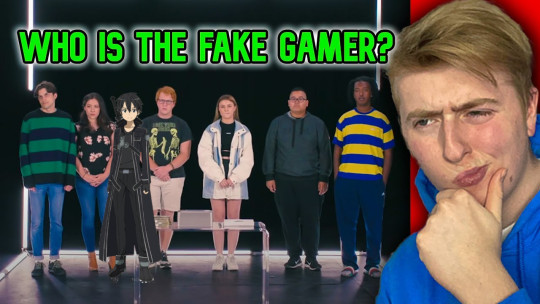
While Sword Art Online is invested in selling its virtual world, it is not invested in selling its virtual game. The in-universe Sword Art Online is primarily defined by its lack of gameplay mechanics, rather than those it actually has. In Episode 1, Klein explains that the game lacks a magic system, which he describes as a "bold choice." In Episode 2, members of the raid party state that the game also lacks a job or class system. There is no long-ranged weaponry; everyone uses melee weapons, usually swords. The only strategy during raids is human wave tactics, where armies of players charge in and attack at once. The only cooperative maneuver is "Switch," a mechanic that is never explicitly explained but seems to involve a player who has already charged in backing off so another player can charge in their place.
Compared to even basic single-player RPGs, these mechanics are primitive; for an MMORPG, they're antediluvian. The point isn't whether a game with these mechanics would be fun or not (in many ways, it's similar to Dark Souls, where the basic core gameplay of dodge-and-hit is rendered meaningful by the consequences for failure), but rather that the game's mechanics have little importance within the story.
They're so unimportant that it's never explained why Kirito is so good at the game, what he's doing differently from everyone else. He's not even a grinder. He spends most of the first half of the story slumming on floors far beneath his level. It's no-nonsense Asuna who grinds hard, who tries to exploit the game mechanics, like when she proposes using NPCs to lure a boss. The plan makes logical sense, but logic is absent from Sword Art Online's ethos; Kirito rejects it, not on the grounds it wouldn't work, but because the NPCs would be killed. He prioritizes respecting the game world, while Asuna—at least initially—prioritizes respecting the game mechanics. Kirito's philosophy is ultimately proven right when he and Asuna adopt an NPC daughter who turns out to be sentient.
Meanwhile, Kirito's most impressive feat involves him ignoring the game's rules entirely. The one mechanic described in detail is that if you die in the game, you die in real life; when Kirito dies, though, he wills himself back alive to defeat the final boss.
The game, the experience of gaming, being a Gamer—none of these are part of the underlying ethos that guides the narrative decisions of Sword Art Online. Kirito didn't tell Klein, "I feel more alive playing this game." He said, "I feel more alive in this virtual world." Asuna didn't find happiness by exploiting the game, but by learning to live in it as though it were her real life. Kayaba didn't design Sword Art Online because he loves games, but because he wanted to make his world real.
This isn't a story about Gamers. It's a story about a virtual world. It's a story about the internet. It's a story about online community.
In his introduction to Speaker for the Dead (1986), Orson Scott Card describes the heroes of most science fiction novels as "perpetual adolescents": "He belongs to no community; he is wandering from place to place, doing good (as he sees it), but then moving on. This is the life of the adolescent, full of passion, intensity, magic, and infinite possibility; but lacking responsibility, rarely expecting to have to stay and bear the consequences of error […] Who but the adolescent is free to have the adventures that most of us are looking for when we turn to storytellers to satisfy our hunger? And yet to me, at least, the most important stories are the ones that teach us how to be civilized: the stories about children and adults, about responsibility and dependency."
Card, of course, wrote Gamer fiction long before anyone craved it. Ender's Game (1985) is obsessed with the mechanical minutiae of its titular game in a way Sword Art Online is not; its protagonist is successful in the mold of Asuna, able to understand and exploit game mechanics better than anyone else. But in this quote, Card describes Kirito perfectly. Kirito is, of course, an actual adolescent, emphasized by his character design and Columbine trench coat ("Don't show up to the GameStop tomorrow," you can almost hear him say), but his character is also adolescent in terms of Card's model. He spends the first half of the story as a solo player, wandering from floor to floor, doing good (usually), moving on. He lacks—or rather, avoids—responsibility. While Asuna is second-in-command of a top guild organizing high-level raids, Kirito is off on his own reviving some girl's Neopet.
When viewed from this perspective, Sword Art Online actually does have a coherent and comprehensible character arc for its otherwise inconsistent protagonist. Kirito develops as a result of his relationship with Asuna, finding through his marriage to her the responsibility that he previously forsook. When Kirito's error causes Sachi to die in Episode 3, he moves on, immediately abandons even his own trauma by Episode 4; Sachi is never mentioned again. (Of course not, since her story was one of the last ones written.) He feels no lasting responsibility for his actions. But later, Kirito realizes he could not brush off the trauma if the same thing happened to Asuna. It is through his responsibility to her that he joins the final raid and thus bears, shoulder to shoulder with everyone else, the cooperative responsibility of the entire virtual community of Sword Art Online. He has become an adult, with wife and child. He has become "more cultured, civilized[,] and empathetic," as Ebert would put it.
(And isn't that what Ebert is really saying, when he criticizes video games? That they are adolescent, childish, playthings?)
Through Kirito's character arc, and its underlying ethos about virtual worlds, Sword Art Online depicts online community via the language of marriage and responsibility that is traditionally ascribed to real-life community. This too resonated with its audience. After all, it wasn't just Gamers who craved recognition. Teenagers in 2012 had lived their entire conscious life in a world defined by the internet, and yet the "real world" considered online relationships and communities to be a joke. Sword Art Online, rather than legitimizing Gamers, legitimizes the virtual world, the internet.
But does it really even do that?
Immediately, Sword Art Online rejects the notion of online identity. Kayaba's first move upon trapping everyone inside the game is to force them all to look like their real-world selves. As per Sword Art Online's anti-logic ethos, he does not explain why he does this. Shortly afterward, Kirito looks at his real-world finger, which received a paper cut before he entered the game; he imagines it bleeding profusely, before saying, "It's not a game. It's real." By enforcing real-world identity within the game world, Kayaba possibly intends players to see the world as more real too, the way Kirito does. This fits the monomaniacal focus of Kayaba, and Sword Art Online as a story, on the importance of virtual space over any other aspect of virtual experience, and it's not surprising that Kirito tacitly agrees with Kayaba's decision when he and Klein tell each other they look better as their real selves than as their avatars. But it also alienates Sword Art Online from its connection to the reality of the internet, where personal identity is far more fluid.
Furthermore, despite his character arc, Kirito ultimately stands apart from his online community. At the end of the story, everyone lies on the ground paralyzed as he alone is given the privilege to duel the final boss, one-on-one. At this climactic moment, Kirito returns to being a solo player, while every other member of the community lacks agency, including Asuna. Especially Asuna. Shortly before the final battle, Asuna claims she'll commit suicide if Kirito dies, which is already an unhealthily adolescent view of marriage (as seen in Romeo & Juliet). Then, before the duel, when Asuna is paralyzed, Kirito demands that Kayaba "fix it so Asuna can't kill herself." Not only has Kayaba, the villain, stolen Asuna's agency over her own body, but now her husband is requesting he steal even more of it.
This, too, is part of Sword Art Online's ethos. Though the game has 10,000 people, nobody except Kirito actually matters. He is a "Solo Player" in the sense of Solo Leveling, the most popular airing anime, which has a mistranslated title; it should be "Only I Level Up." The implication of the real title is clear: Only the protagonist has agency. Kirito is the same. Only he plays the game, in any meaningful sense. The game—reality—bends to him; none of its rules, even death, constrain him.
It is total self-centeredness, a complete rejection of the responsibility to society that Card describes. This ethos pervades the show. Kirito is never wrong, even when he obviously is, like when he rejects Asuna's proposal to use NPCs as bait. The entire reason he realizes Heathcliff is Kayaba is because, during an earlier duel, Heathcliff beat him; Kirito (correctly) posits that someone who beat him must have been cheating. Everyone who likes Kirito is good, everyone who dislikes him is evil; Kuradeel, who chafes with Kirito initially over bureaucratic guild regulations, eventually unmasks himself as a sadistic serial killer. Every girl is in love with him, a harem rendered vestigial because Kirito is married to Asuna and expresses zero interest in Silica or Lisbeth or his sister or the second season's Carne Asada; but it's not about whether Kirito wants a harem, it's about the prestige of his ability to command one.
This is where the true face of Sword Art Online shows itself, what truly made it so popular, and where the core of its long-lasting influence remains.
Only the virtual world matters. Not the game, not the online community, not online identity. Only a different world, one that isn't the real world. And in this world, only Kirito matters. Sure, he'll fight to protect other people. Exactly like he'll fight to protect NPCs. In this world, real people are worth the same as NPCs, compared to Kirito. His wife is a real person; his daughter is not. But really, both his marriage and his child are a form of playacting, pretending at adulthood. When convenient, they are disregarded and trampled upon. Asuna spends the next two arcs of Sword Art Online sidelined—even viciously sexually assaulted—so Kirito can hang out with girls he doesn't even like, just because they're shiny and new; Yui is almost completely forgotten after the second arc, like a discarded toy.
This is an ethos of pure, distilled escapism. It is an escape from the real world to a false one, where every conceivable selfish fantasy is rendered real, where every desire can be granted and then disposed of when no longer wanted. It is an ethos without responsibility, without consequence.
And without shame. Sword Art Online is remarkably devoid of self-consciousness. It treats as real its virtual world, but doesn't feel the need to justify that world with logic. It doesn't feel the need to justify anything with logic; what it says is so, self-evidently.
In my Kill la Kill essay, I mentioned Sword Art Online's vast influence, and someone wrote (and sadly deleted) a well-reasoned response that explained how the aesthetics and tropes of modern isekai are much more heavily influenced by Japanese webfic that predate Sword Art Online, like GATE or Overlord or Re:Zero. That's true; I'd add that modern Gamer fiction, which is often obsessively concerned with the rules and statistics underlying game logic, is also not very similar to Sword Art Online on a superficial level. But Sword Art Online's ethos transcends genre. It can be found in isekai, Gamer lit, or even genres popular long before Sword Art Online, like battle shounen. Sword Art Online created the web fiction to light novel to anime pipeline, and in doing so popularized amateur literature and its decidedly adolescent mentality of shameless and solipsistic self-indulgence. "Only I Play the Game."
529 notes
·
View notes
Text
𝐚𝐧𝐠𝐞𝐥 𝐨𝐟 𝐬𝐚𝐭𝐢𝐬𝐟𝐚𝐜𝐭𝐢𝐨𝐧 || 𝐇𝐚𝐧 𝐉𝐞𝐨𝐧𝐠-𝐖𝐨𝐧 𝐱 𝐟𝐞𝐦!𝐫𝐞𝐚𝐝𝐞𝐫

part one: here // part two: kiss away
summary_ amidst studying in Korea and having an ordinary life, you fall in love with a wealthy man, but turns out he had too many secrets, for example, being married.
warnings_ age gap (not specified but reader is in uni), implied sex, cheating, fluff, angst, jeong-won is still tormented but it’s truly happy with reader, reader wants to be a teacher and is implied to be American, NO PROOFREAD YET
notes_ pls listen to angel of satisfaction is such a banger 𝄞⨾𓍢ִ໋♬⋆. Using the salesman tag bc we need to avoid the flop okay?
♫ ♪ the worst playlist 4 gong yoo
✰ Index (+ fics here)
୨ৎ───୨ৎ───୨ৎ———୨ৎ───୨ৎ
In his arms, you felt safe.
With his kisses, you felt cherished.
The man who urgently smashed his lips with yours in the middle of the dance floor while music blasted from the speakers was the love of your life.
He couldn’t resist the temptation. Couldn’t miss the chance and needed to let you know he always loved you. That everything was true.
“Please, believe me…” he pleaded.
“Fuck you, Jeong-Won”
Frivolously, you leave the taste of poison on his lips. His hand tried to grab yours, but you slipped, leaving him.
Like you had already done before.
But it didn’t make it easier, because tears started falling down the first step out of the club.
And in the middle of the cold night, you slip into your coat and start a quiet walk towards home.
You wished you knew he was mourning a life he had before you.
…
[eight months ago]
Leaving your comfort zone was something you hated. But as soon as you grasped the change, you easily adapted to it.
For a couple of months, surviving all alone in South Korea seemed like it would never cease to feel like a struggle. But you were patient enough to make friends, move out of the dorms of university, and find a home in the wealthy godmother of yours who let you stay at an apartment she had.
Her kindness was so big that she even arranged a full remodeling project that lasted months.
And it was one of those weekends when you finished early your assignments and essays that a plan popped out. Working as a counselor assistant did little to support you financially but the aid from your home government was a good complement. Hence why you couldn’t refuse a night out with your friends; Jade, Ruby, and Seoun-mi.
“Can you pass me the highlighter?” Asks your blonde friend Ruby. It was Seoun-mi who passed her the shiny compact while rolling her eyes. “You already used it, Ruby”
“It’s not enough” You start laughing and Jade joins you.
“Don’t you girls think my dress is a little too much?” You ask pointing at the bright orange dress with scattered sequins hanging from your door. “Do you want to meet guys?”
“God no” you reply to Jade, shaking your head.
“Then wear black tights and some fitted boots” Ruby suggests, which comforts you enough to agree.
“The club we’re going to is not popular with foreigners or students. Boys won’t hit on us” Seoun-mi states, putting on her kneels.
“Good” you affirm. “I’m not in the mood for men”
…
Even with the lights out and neon flashes flying all over the place, your orange dress was making a statement. But in the company of your friends, you weren’t paying attention. A Nelly Furtado song from the 2000s was playing when Ruby complained she wanted some vodka. It was you who offered to ask for it.
And it was then when Han Jeong-Won was coming out of the restroom after smoking a cigarette. He had been deep into shit in that same place months ago, barely conscious and fighting a man. But now, he was at the club, along with the mere purpose of disconnecting from his life for a little while.
The crowd only swayed along to the music, Jeong-Won seated at the bar, but he couldn’t help but notice you were the only person actually dancing, it made him stare longer. Until he caught himself eyeing you up and down.
Definitely foreigner; lousy, careless but refined.
It was such a big coincidence that you walked towards him when the song was over. He heard you laughing at something your friends said in the distance. Fluid English coming out of your mouth.
“Hi! Any vodka or tequila?” You don’t look at the man beside you, his elbow almost touching your ribs. “Just vodka. Bottle or ?….”
“The bottle is fine” you confidently say, the bartender nods and disappears to get your wish.
“Fun Saturday?” The man beside you asked. You turned to eye him, surprised to hear his English was very good. And of course, his attractiveness didn’t pass unnoticed by you.
“I guess so…” you say nodding. “Hey, your English is really good”
“It was a requirement in university” his voice was deep, and even in the middle of the chaos of the club, you could hear him perfectly well. “I wasn’t very good at the beginning”
“Oh, so are you done with your career?” He nodded, drinking from his glass, which seemed to be something like a mojito. “Music engineer”
“You produce? Show me something you’ve done, I love music. There is no day without me playing music…” he chuckles and you realize you were flirting, almost making you freeze. “I do produce actually. But what about you?”
“I’m trying to get into the educational department. I really like to write. So University counselor or professor will be fine…” he nods, hiding his surprise and awe.
“That’s really nice…” his fingers twirl around the straw of his drink, a little smirk in the corner of his lips. “Maybe you can show me your writings one day…”
Your smile grows playful, accepting the fact that he is also flirting with you.
“Isn’t it that I’m a little too young for you?”
“We’re just talking”
“You’re right, my bad…” both of you laugh.
The bartender ruined the moment, he handed you the bottle and you handed back a bill. You offer the mystery man a last glance before turning to leave.
“Hey!” You turn to see him. “I didn’t get your name or anything…”
“If it’s meant to be, we’ll meet again!” you say smiling before disappearing into the crowd of people dancing.
Jeong-won remained there seated, smiling as he finished his drink. And at that moment he realized how much he had smiled in the short span of less than ten minutes.
…
The sound of your stomach growling made your steps hurry up, almost jogging down the street. You arrived at a burger shop, eager to order.
“Just no cheese and no onion please” the girl nods, handing you your receipt and your cup. “Thanks”
As your order awaits, you pick diet cherry vanilla coke from the soda fountain. You hear your number and after grabbing your bag, you are ready to eat outside because the weather is nice. Your receipt falls and when you’re about to pick it up, a big hand does it for you.
It’s him.
“So it was meant to be?….” He asks as soon as he notices it’s you as well. You smile briefly, before feeling your cheeks are heating up. “Apparently…”
He was wearing a sweatshirt and some jacket, jeans, and random sneakers. He was very handsome. With the help of the daylight, you can see he’s older than you. But he’s still gorgeous.
“Where are your friends?” You roll your eyes playfully. “They have classes today”
“And you don’t?” He had also picked up his order and looked tired. “No, I always avoid classes on Fridays or the weekends”
“Ah, smart girl” he sounds so perfect, too nice and calm.
“So, any plans? Or you wanted to eat alone?”
“Well, I planned to eat outside and then take the sub to a mall. I need some new clothes…” Still holding his bag or food, he nodded.
“I’ll propose you something…”
“Uh huh?” He nods again, chuckling.
“You eat with me inside and I take you to the mall” Finally your cheeks heat up completely and he notices.
“Dude, I don’t even know your name” both of you start laughing.
“Han Jeong-Won”
“I’m y/n”
Both of you smile and then you offer your hand for him to shake. Which he considers so occidental, but agrees to do so.
And once again, he noticed how much he was smiling and forgetting about some details of his life.
…
An hour and a half later, you know more about his job, but mostly he asked about you, which made you feel like he wasn’t trying to show off. Or he could be hiding something but he was very chill and kind. After finishing your food, both of you walk outside.
“Oh, you have to be fucking kidding me,” you say chuckling, abruptly stopping at the parking lot.
Jeong-won owned a grey Hennessey Venom F5 and was proudly standing beside the driver’s door.
“This is too much for me” he starts laughing.
“Stop trying to sound humble”
“But I am!” You reply also laughing. “I like some expensive stuff but mostly I find this very ostentatious”
“But it’s pretty, isn’t it?” his smirk makes you roll your eyes and look away, smiling.
“Oh, sure it is…” he walks over and opens the passenger seat for you, gentlemanly inviting you to sit.
“Only pretty girls get to sit here”
“That’s so tacky” Both of you start laughing again. But you finally take a seat and he closes the door.
All the way to the mall he showed you some of the music he produced. Jeong-Won was a serious man, but in the 24 hours you had met him, he was always able to offer you a smile or laugh. His phone continuously rang and you urged him to answer but he said it wasn’t important.
If only you had been able to see the screen…
…
Jeong-won followed you through the candle store, pretending to be attracted to some of the bright bottles with wax and odors but the truth was that he only wanted to listen to you.
“And I don’t like fish. Ahi tuna is fine but it’s mostly raw so…”
“You prefer meat?”
“If it was on me, I would gladly eat purely tofu. But I really like burgers and steaks” you admit giggling.
Your heart continuously beating made you accept you really liked the man beside you. He had made you feel so comfortable and welcome since you met him.
“Oh, I can cook you a steak with vegetables, it’s one of the few dishes I enjoy doing myself” Your cheeks blushed again at his statement. Was he inviting you to meet again?
“But you said you don’t eat at home” you object, deciding on a cardamom candle and going straight to pay.
“I can make exceptions” Once again you meet his smile and it makes you feel delusional. The intrusive thought of anticipating him as the one merging.
“And I will make tofu appetizers” It was on purpose your mocking tone. Just in case Jeong-won never meant to invite you on a date.
“Next Friday. My place. Casual dinner…” he offers, leaning on the counter as you pay your candle. “What do you say?”
“Alright,” his proud smile makes you roll your eyes at him before grabbing your bags and exiting the store.
You think it’s time to tell your friends about him.
…
“NO WAY! The hot dude we saw you talking to at the club?” Jade screams through the video call. You start laughing and nodding.
Everyone one of your friends is shocked.
“We met at the burger shop and then he took me to the mall and there he literally went shopping with me and at the end invited me to have dinner at his place next Friday” Everyone starts yelling and cheering, making it harder for you to believe that you pulled up a hot man like Han Jeong-won.
“Baby, we’re coming tomorrow and we won’t leave until you have an appointment made for your hair and a waxing,” Ruby tells you and it makes you burst laughing.
“Actually that would be nice. And please stay over, you can practically move in with me if you want”
“We can’t move in when you’re one step away from getting a boyfriend, unnie” says Seoun-mi, which makes everyone burst laughing again.
…
The house was ridiculously clean and big. Jeong-won kept his promise and cooked a steak with vegetables. Your tofu was also gone, he let you pick a glass of wine from the floor below and there he kissed you.
“Isn’t it that I’m a little too young for you?” You repeated what you said the night you met him at the club, Jeong-won chuckled, still holding your waist. “You are, but… I feel very comfortable when I’m with you”
You smile, feeling your heart flutter in love. He was so adorable and sweet, only a gentleman to you since you met him.
“I feel the same way about you” In the dark wine cellar of the house, you barely can see the features of Jeong-won, his hair looks even darker than it is and he had to slightly bend over to face you.
Which led to having a dinner full of teasing, leading to you kissing him in his lap upstairs with the TV on in the background.
“We can stop if you want…” he whispers in your mouth. But it’s too fucking late.
You can feel how hard he is, you can feel your panties are growing wet.
“It’s okay, I want you…” He throws his head back when you grind against him. And it’s oddly beautiful how you’d never considered a man so pretty like him.
“Keep moving like that…” he says barely able to talk properly. That makes you feel confident and sexy.
“Fuck, you’re so pretty, darling…” you moan on his lips, knowing it’s over once he takes out his cock and puts aside your panties.
“Jeong-won!” you moan his name, repeating it like a mantra over and over again.
You can’t believe how good things are going. So good that you are blinded enough to miss the red flags.
…
Four months together. He didn’t know how it happened. Six months ago he married Noh In-ji just to please his ex-wife. His cheating was not in the plans. You weren’t meant to appear in his life.
Jeong-won never considered age gaps romantic. His parents had one and it didn’t go well, let alone the other problems he had to witness as a kid. In fact, he thought you were pretty but he was only being friendly when you ended up by his side that night at the club.
But he started to feel very comfortable as you talked to him. He didn’t feel the need to oppress his feelings as usual. He allowed himself to smile, laugh, and be talkative.
Jeong-won felt alive.
Whenever you were around he was able to forget about his ex-wife, the baby, his pain, and dealing with his difficult new wife.
Just when he was so close to falling for In-ji.
Your voice singing caught him in his inner thoughts and briefly eyed you taking pictures of the landscape as he drove through the empty highway.
Jeong-won returned his attention to the highly and smiled.
“You should autotune my voice, honey. I know I am no singer” you admit smirking at him before looking away.
“Actually you sound fine…” The small he offers you is sweet and makes you want to lean and kiss him deeply. But he’s driving you to a lake he loved to go to in his free time to fish and just pass the time.
“Bullshit. But I’ll take the compliment” he chuckles, showing you his right dimple from the view of his profile. “Whatever. Tell me about the lake”
“I used to go there a lot since I was a teenager. Whenever things got rough at home, I went there to… forget about it” his uncomfortable tone made you seize your smile. He told you about his parents and his harsh infancy. You couldn’t blame him.
“It’s different now. I go there with my boss, who’s also my friend. And now I’m taking you there… only good times now. I promise”
He also took In-ji to the lake once. Jeong-won desperately pleaded for the right moment to tell you the truth. He had two months left of marriage. His ex-wife still haunted him a little but he was comfortable after pushing her away. There was a lunatic after In-ji but since she didn’t want him to be nosy about it, he found more than comfort in you.
“We’re here!” You squeal excitedly, making him smile at the sight.
Once he parks the car, you get out to appreciate the view. Jeong-won has been there so many times that the only beauty he sees is you.
In sneakers, jeans, sweater, coat, and camera in hand. You look so ordinary, yet so perfect to his eyes. You were the woman he really wanted to call his partner.
That didn’t mean Jeong-won didn’t feel so terrible for lying to you. For also lying to In-ji and getting away with it.
“JEONG-WON! HURRY UP, HONEY!” You yell, noticing he got lost in his head. You wonder what was he thinking. But you soon forget as he gives you one of his cutest smiles.
He starts literally jogging towards you, making you laugh, urging you to run so he can catch you.
The adrenaline flows when he starts running behind you. All you can feel is peace and joy. The man that catches you in his arms is your boyfriend.
“Got you, sweetheart,” he says in your ear, making you blush as he spins you to lean and kiss you.
His lips were soft despite his rough appearance. Jeong-won in general was so sweet, touch deprived and you were the one who broke those barriers.
He’s all you never knew you wanted and someone you weren’t waiting for…
“I love you” you admit confidently. He smirks, tilting his head.
“Me too” he admits to his own surprise.
He knows there’s no way back.
…
Periwinkle was one of your least favorite colors. But you loved how a dress of that color fitted you with grey tights and heels, a grey coat covering you as well as you entered the fancy restaurant. Jeong-won insisted that you two had to celebrate your achievement of passing every midterm of the semester.
“I’ll get the squash blossom soup” you order after your boyfriend and once the waitress leaves, it’s just you and him.
“You always look pretty, but I really think you look lovely tonight, darling…” Your face burns and you shyly smile, hiding your face behind your glass of wine.
“Ah ah, don’t hide from me! I’m being serious” he says chuckling, trying to move the glass away. “It doesn’t match the necklace, but it’s okay”
“I don’t care. I love the necklace and I’ll wear it every single day. Even if it doesn’t match…”
He gifted you a Tiffany gold necklace with a heart pendant. You were embarrassed but enamored by it. He shushed your attempts to politely reject the gift by burying his face between your legs. It left you with no choice but to place the necklace around your neck and admire it in a nearby mirror as you rode him at your apartment.
Luckily Seoun-mi made you an appointment at a public hospital to get your birth control.
When you least expect it, you already finishing your squash blossom soup. Jeong-won is nearly done with his plate and both of you are laughing because he almost spilled the wine.
The solid proof of Jeong-won feeling head over heels for you is evident when all he can focus on is your face.
Although there are no wrinkles in your face yet, some appear around your eyes as you keep laughing. He smiles, ignoring all of his surroundings, miserably ignoring the approaching figure coming to the table.
Everything is perfect until you spot a beige coat, your laughs suddenly stopping as you look up to encounter a woman.
Fear starts creeping up as you notice how Jeong-won also stops smiling, only to lock his eyes with the woman before she turns her head to scan you.
She’s young, maybe a little older than you, like your boyfriend. But she’s very pretty and elegant. But her cold demeanor makes you uncomfortable, the feeling doesn’t abandon you as she looks away from you.
“You didn’t tell me you were having dinner out, sweetheart” she speaks to him in Korean, offering a cold and feigned smile.
You are no fool, quickly thinking the worst. Hoping it’s a mistake.
“In-ji…” he reveals the woman’s name and sounds almost like he’s begging. But you don’t know what.
“I’m sorry, What is happening?” you dare to ask, making both of them turn to look at you.
“I’m Han Jeong-Won’s wife”
Color leaves your face, your stomach awkwardly churns and your hands start to shake, getting on your nerves.
How did Jeong-won hide it so well?
Why? Why? Why? Why?
“Earlier, your phone call accidentally linked to the car I borrowed” the woman reveals, but nobody says anything.
But you know it’s time to go…
Embarrassment floods you, making you a mess of yourself. Your cheeks burn so bad that your face looks red as a beet, you can feel your heart racing and your hands keep shaking as much as you try to calm yourself.
You stand up from the table, hurrying to grab your coat and purse.
“Please, y/n…” you hear Jeong-won calling you, but you don’t even look at him.
“The least you can do is pay for my dinner and beg on your knees for forgiveness to your wife…” you spit out, unable to look at any of them or the nosy people having dinner in the place.
The unwanted attention makes you sick. Only worsening the moment.
The couple stares at you, noticing that even when you were walking away, it was obvious that you started crying and you tried to wipe the tears away.
In-ji almost felt bad for you. Despite looking young and careless, you seemed mature enough. She expected to argue, but she ended up surprised to see you only left and eyed her with evident apologies.
“I deserve an explanation,” she says once you’re finally out of their sight.
“Yeah, you do…” Jeong-won admits, sighing after handing his card to pay the check.
He would pay for your dinner but he would not beg for forgiveness to his wife.
“Why did you do this?” In-ji asks as both leave the restaurant.
She’s certainly jealous but hides it so well. And more than that, she is curious.
“When I’m with her, I don’t feel tormented. I can be myself with no restrains…” he says, looking tired, beat down by the situation, but he briefly smiled at the tons of memories he had made with you.
“Did you ever feel that way with me?” Suddenly In-ji felt nervous, but she had to know.
“I did” After some silence, Jeong-won adds “I was so close to falling for you, but you proved to me we could never trust each other completely”
“That’s not true”
“She picked you well and was right. I will never match with you…”
That breaks her heart. Knowing damn well what he meant.
Her eyes get teary but feels confident to throw the next question.
“Do you love her, Jeong-won?”
“I love her”
She nods, watching him walk away towards his car.
The ex-wife, the wife, and the girlfriend…
Get a fucking grip, man. Get your shit together, Jeong-won thought.
A disastrous marriage, a fake one, and a healthy relationship.
From three totally different relationships, only one had made him feel safe and comfortable.
It was yours and his name that he wanted to see and hear together.
He was the perfect boyfriend but a shit of a person. And of course, you didn’t deserve that.
You deserved his pleas. And so you would get them.
୨ৎ───୨ৎ───୨ৎ———୨ৎ───୨ৎ
Part two or what?
taglist: @stargirl-mayaa @czarinera @dovediva @dreamersparacosm @girlythings111 @love2fangirl @migueloharassoulmate @fangirl4lifetime @wonallofme @otakusimp1
#gong yoo x reader#gong yoo#the trunk#han jeong won x reader#han jeong won#the salesman x reader#the salesman#the recruiter#recruiter x reader
751 notes
·
View notes
Text
Sigil Magick: Illustrating Your Intent

Sigils are a cornerstone of contemporary and chaos magick and function as keys to unlock the doors of reality and bend it to one’s will. These potent symbols serve as physical embodiments of one’s intentions, cast into existence through the fusion of art and willpower.
The crafting of a sigil begins with a clear and focused intention, which is then worked into a unique symbol through a creative magickal process. The magick practitioner inscribes deep personal meaning and style into their designs, making each unique to its artist. Sigils are ideal tools for manifesting your desires, imbuing objects with specific purpose and energy, protecting spaces, and communicating with the spirit world and should be used responsibly.
Origins
The practice of crafting sigils traces its roots to the ancient world but was modernized in the early 20th century by the works of Austin Osman Spare, an occultist and artist. He introduced the method of creating magical symbols by condensing letters of a desire into an abstract design. Aleister Crowley, too, influenced the practice by intertwining sigils with ceremonial magick, embedding them with a rich esoteric significance.
Some occult grimoires employ sigils as a means of contacting spirits, for example; Ars Goetia, The Book of Oberon, and Pseudomonarchia Daemonum.
Basics of Sigil Magick
Sigil magick emerges from the belief in one’s ability to manifest their focus into reality. Through a process of creation, a sigil becomes much more than mere ink on paper—it is the illustrated essence of desire. Individuals can use sigils as focal points for their will, empowering these symbols through meditation or ritual to enact change. The universe of sigils is vast and varied, types of sigils include:
• Pictorial Sigils: Intuitive symbols drawn from the subconscious
• Runic Sigils: Combinations of runic alphabets that resonate with specific energies
• Word Sigils: Derived from statements of intention, where letters are crafted into a unique symbol
Correspondences also serve a purpose in this class of magick, in order to help align one's intent to universal energies. As an artist crafts their sigil, they intertwine traditional symbols with personal significance, creating a bridge to the metaphysical world. Some relevant correspondences are:
• Numerology: Numbers carry vibrations that can enhance a sigil’s purpose.
• Zodiac Signs: Celestial influences infused to fine-tune the focus.
• Elements: The classic forces of Earth, Air, Fire, and Water lend their power to sigils, grounding them in natural harmony.
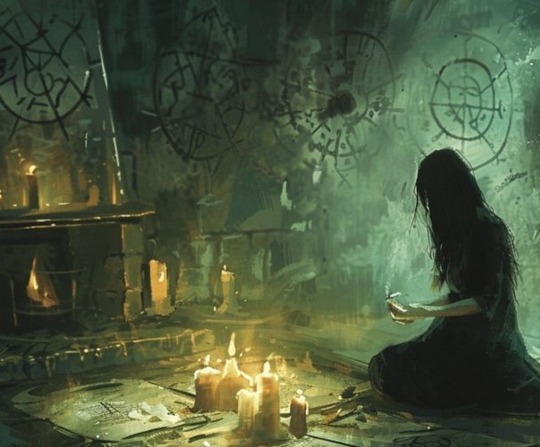
Sigil Creation
Before you take pen to paper, first envision your intent with clarity and purpose This may involve some deep introspection into the true nature of your desires. A precise intention lays the foundation for the sigil's power. Once ready, write out your intention and cross out any duplicate letters. From here a couple different methods can be utilized. Naturally you could always draw your sigils from pure instinct, creating spontaneous shapes to represent your intentions, but there are other techniques available.
The Wheel
This method employs a wheel to be used as a map for drawing your sigil. Simply start at the first letter of your intent and draw lines to each subsequent letter. Example:
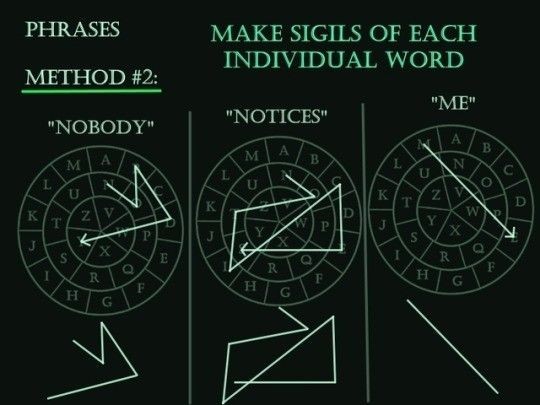
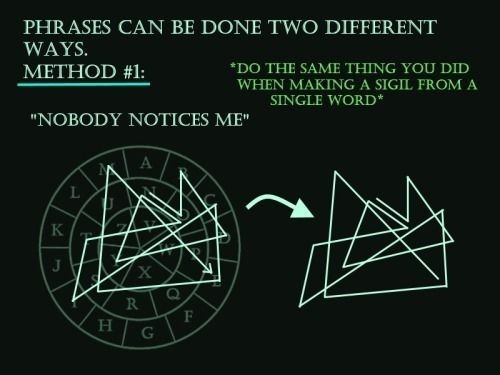
My Method
I make my sigils by breaking up the letters to create shapes. I will often decorate with extra shapes, symbols, and pictures as well. Here is a simplified example of my sigil creation process:
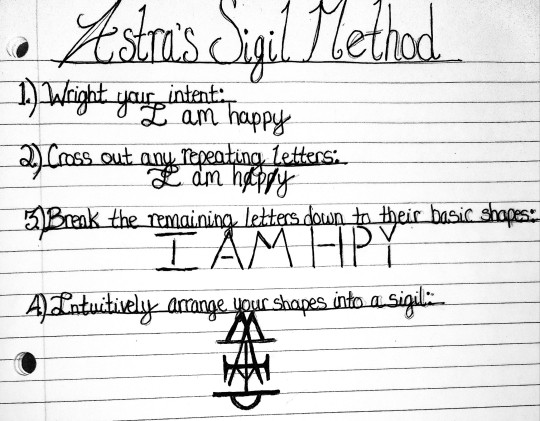
Next you must charge your sigil. Charging is the act of infusing the sigil with energy. The creator might enter a meditative state, focusing intently on the sigil while envisioning their intentions intertwining with the design. This act of focused concentration serves to embed the intention within the sigil, making it a beacon for the desired change.
Passive and Active Sigils
Intentioned sigils fall into either the passive or active sigil category based on how that sigil's energy is best utilized. Passive sigils are usually drawn on the body, item, or surface and then left alone to release their power over time. Active sigils involve some action to trigger the release of the sigil's energy, such as burning, burying, soaking with water/oil, and more. Some sigils can be used both passively and actively, but most will fall into one category.
Spirit Sigils
Many spirits and deities have sigils that represent them and these can be powerful catalysts for interacting with these beings. If the spirit you're working with doesn't have a sigil made for them (or even if they do) you can design your own symbol to connect with that spirit. Follow the same process, but instead of focusing on your intent, focus on the spirit/deity and connecting with it. You can even perform a ritual and provide an offering to invite the spirit into your space. This will allow you to draw divine inspiration straight from the source. Here are some examples of spirit/deity sigils, as well as some I created:




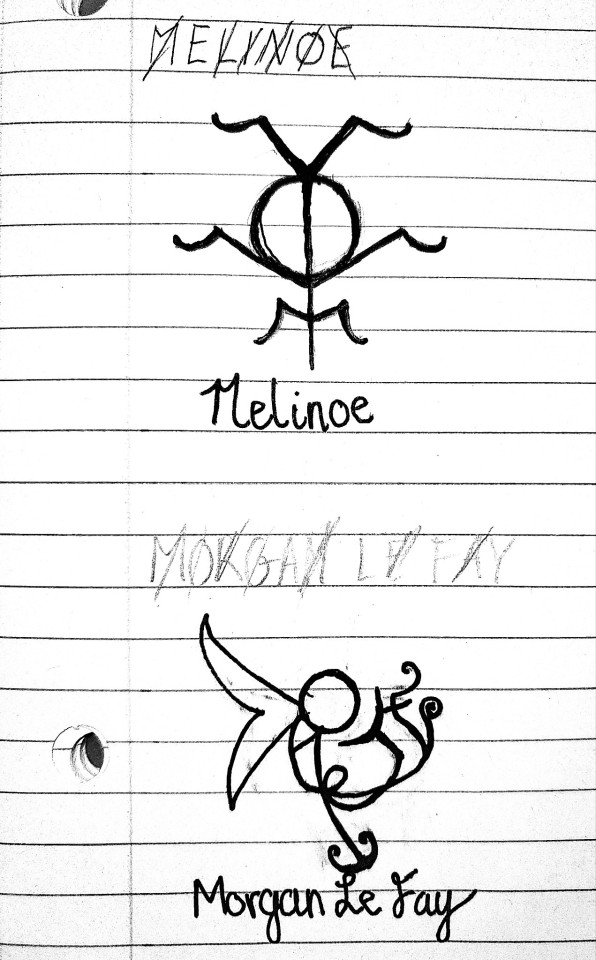
#magick#witch#witchcraft#sigil#sigils#sigil magic#sigil magick#chaos#chaos magick#chaos magic#chaos witch#satanic witch#lefthandpath#dark#satanism#demons#demonolatry#spirit work#spell work#spellwork#spell#spells#spellcasting#symbology#symbolism#symbols#eclectic#witchblr#witch community#pagan
655 notes
·
View notes
Text
gender/sex abolition is a very worthwhile thing to aim for, but it cannot be done by wishing it away--it is done through the full dissolution of the patriarchal system. based on that statement it sounds like we are far away from that, and that is indeed the case. and more crucially, it means this cannot be achieved by wishing it away and pretending it does not exist. transmisogyny, for example, is an institutional force that we are faced with every day. this is the exact value of tme/tma as terminology--not to reinforce a sex binary, but to describe an oppression by literally naming it directly.
i sympathize with the desire to be rid of amab/afab as labels. in a certain context there is value to this, where those labels have been used to repackage biological determinism. but discarding them fully is bound to fall short, because we are still bound to systemic (rather than biological) circumstances based on our agab. that is the arena of this terminology. if we were to discard them, we would discard a piece of essential language towards understanding the oppressions trans people face. to put it another way, whether we like it or not we are bound to these categories by hegemonic society, and to that end it is sometimes useful to name them. and while tme/tma is not a synonym for afab/amab, it exists for the same purpose. and all the same, if we did not have it we would be lacking a critical piece of language to describe oppression.
so when trans women use these terminologies to have critical discussions about transmisogyny, we aren't trying to reassert the gender binary or biological determinism. we are trying to have critical discussions about transmisogyny! something we cannot solve by pretending it does not exist.
1K notes
·
View notes
Text
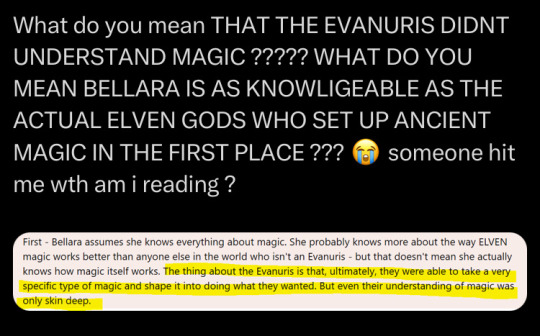
Dropping this as an example and leaving out any names - so please don’t go and start an argument with these people or harass anyone. It’s not why I'm writing this, it gives them more attention, and there is no room for an actual conversation.
But, to my point! I am starting to believe that people online aren’t always shitheads on purpose. They are seriously lacking reading comprehension and that is absolutely terrifying.
In this one example the dev has not said any of the things they are being accused of. Let me break this down a bit.
Starting with the Bellara statement - the answer literally says Bellara is the most knowledgeable when it comes to elven magic EXCEPT compared to the elven gods. And even then, it’s prefaced by two things: 1. PROBABLY, which is used to show that it’s not a certainty and that there's a high chance there are others around the world (let’s saaay... people like Merrill), but they are not within reach so it's inconsequential. And 2. ‘Bellara ASSUMES’, which implies she doesn’t actually hold the totality of knowledge. The game shows again and again that she is in the process of learning through experimenting and nothing in this answer contradicts that. Additionally, literally during the game, Bellara has access to Solas’s ancient library at the Lighthouse AND an ancient archive of knowledge. Basically she has MANUALS on ancient magic from the very people that practiced it.
2. ‘Evanuris don’t understand magic’ - again the answer never said that. What it conveyed was that the Evanuris had access to magic and found ways to make it work for them. It was a tool, much like electricity: we didn’t invent it, it is a phenomenon we learnt to turn into power and use. The game kept reminding everyone again and again that the Evanuris weren’t gods, just powerful mages and Epler’s answer just reaffirmed that. (Plus this is something previous games have also hinted at repeatedly). The Elven Gods didn’t invent magic, and much like everyone else in Thedas, after they tapped into that force they started applying it in ways they were able to understand. Solas himself (the voice the devs created to tell a story) said that in so many ways throughout the game, so why are people acting like this is the first time they're hearing about it??
Anyway, this is just me taking the time to analyze one of the many absolutely mind-boggling takes that exist out there, and there’s… a lot of them. These people should just put the phone down and open a book.
#dragon age#dragon age the veilguard#solas#bellara lutare#evanuris#ghilan'nain#elgar'nan#dragon age lore#fandom critical#john epler#datv#veilguard#da veilguard#i can’t wrap my head around it#this is what people are getting angry about#what nonsense#i don’t want to be that crazy old lady but#internet hivemind and echo chambers
551 notes
·
View notes
Text
Hua Cheng absolutely destroying the 33 gods that hurt Xie Lian is one of the sexiest thing I’ve ever read. I get so tired of stories preaching restraint in regards to revenge. I think it tends to invalidate the suffering that many of the characters seeking revenge faced.
BUT at the same time I think it’s also important to acknowledge that it wasn’t just a romantic gesture. To Hua Cheng these gods were no different than the bullies that cruelly tormented him all his life simply for being different and weak. His condemnation of their actions was also for himself. A statement of how power and strength should be used. That the way these gods treated someone they considered beneath them wasn’t acceptable.
It’s important to note that Hua Cheng has no contempt for those who are powerless. An important example being Yin Yu. He had no responsibility to take him in but he does. He gives him a purpose. Protects him from the cruel fate he might have faced similar to the kind Xie Lian dealt with after his first banishment. He treats people according to the actions they make. Not the position they are in.
You can also see this in his love for Xie Lian. It isn’t just based on a simple infatuation or rooted in a childish crush. He reveres Xie Lian as his god but loves him for being the human he is. It’s why he can accept Xie Lians flaws and mistakes easily. He loves him for them and not in spite of them. It is the most sincere and genuine form of love a person can have and I think the reason so many readers love him is because it’s also what we yearn ourselves. To be loved for who we are. Flaws and all.
766 notes
·
View notes